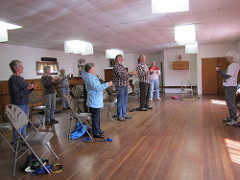
We all know that we need exercise in order to be truly healthy. And most of us don’t like it much. We may put “active” on our internet dating profiles, and we may even try to get in some sports and exercise occasionally. But for most of us, gym membership cards sit in our wallets unused, we sit in a chair in front of a computer most of the day, and we worry that one day our lack of exercise may catch up with us.
And according to the Institute of Medicine, it will. According to a report released by this institute several years ago, in order to maintain a high level of cardiovascular health, the magical number of exercise minutes we need to get in during a day is a whopping 60. The healthiest of us work out the equivalent of 60 minutes a day, seven days a week. That means one hour of vigorous activity: running, walking at a brisk pace (at least 4 to 5 miles per hour), aerobic dancing, kickboxing, etc. And adding up the minutes spent doing normal, everyday physical activities like vacuuming and shopping doesn’t count.
Getting in the Exercise You Need
The truth is, the more exercise you get, the better. One full hour of vigorous exercise is enough to keep your heart healthy. But an hour and a half is better for you than just one, and two hours is better still. So if you have an extra hour or two every day to spend exercising (and you have the self discipline to actually do it), you’re taking a big step towards improving your long term health. But while 60 minutes a day is the “magical” amount of exercise needed to keep you in top cardiovascular condition, most of us can’t find the time or the discipline to exercise that much. Sound familiar?
So if you can’t exercise the prescribed hour a day, how much good does your current amount of exercise do your body? How much exercise to do you need to get in a day in order to improve your health– even if you can’t reach that “magic” 60 minutes?
Actually, you need less than you might think. Because getting exercise is overwhelmingly good for you, the model above also works in reverse. The more exercise you get, the healthier you’ll be. So exercising even a bit is going to be good for your health.
According to many studies done by medical experts, your risk of cardiovascular disease can be reduced anywhere from 30 to 50{3813292df256cc7359db914c8bfffc508a0964aa786224d36d2cb21f4b33d600} by regular exercise. And you need much less than 60 minutes a day to get this benefit. The New England Journal of Medicine has recently reported that just two and a half hours of moderate exercise a week reduces the risk of cardiac problems by 30{3813292df256cc7359db914c8bfffc508a0964aa786224d36d2cb21f4b33d600}. That’s just twenty minutes or so of exercise a day, or 60 minutes just two and a half times a week. And people who exercised more than two and a half hours weekly (but still far less than 60 minutes a day) saw an even better improvement in their cardiovascular risk.
You already know that exercise is good for you. It makes you feel better, look better, and live longer. But if you’re under the impression that you need to get a certain amount of exercise in order to see a positive result, you may begin to wonder what is the point of getting in just a little bit exercise. Well, it’s a big point: your health. Only a little bit of exercise a day is enough to improve your chances of staying healthier longer. And that’s not something to scoff at. So get out your gym membership card or go for a brisk walk. Even if it’s only for 20 minutes.
predict how long it will last? Well, while predictions are only that –predictions– economists are looking at the way recessions behave in general to predict what the current one will do.
Since World War II, the average length of the 10 recessions that took place up until today is about 10 months. But because the current recession has already lasted more than 12 months (having begun in December of 2007) and is clearly coming to no end soon, the prediction is that this will be another 16-month recession, like that of 1973-75 and 1981-82. This puts the end of the recession in the middle of 2009.
Of course, predictions aren’t always accurate, and there’s a possibility that this recession will be deeper and longer than experts suggest. But for those of us worried that another Great Depression is on the horizon, the predictions being made about the current situation are a little ray of hope that, perhaps, things aren’t as bad as they seem. How the U.S. economy works!
More Exercise Articles
You must be logged in to post a comment